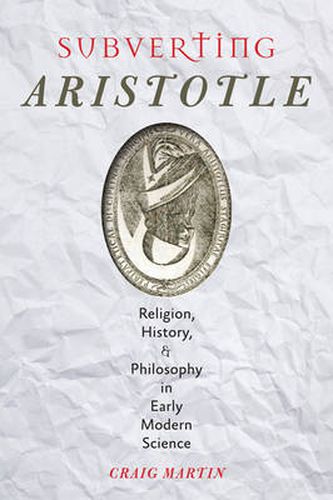Readings Newsletter
Become a Readings Member to make your shopping experience even easier.
Sign in or sign up for free!
You’re not far away from qualifying for FREE standard shipping within Australia
You’ve qualified for FREE standard shipping within Australia
The cart is loading…






The belief that Aristotle’s philosophy is incompatible with Christianity is hardly controversial today, writes Craig Martin. Yet for centuries, Christian culture embraced Aristotelian thought as its own, reconciling his philosophy with theology and church doctrine. The image of Aristotle as source of religious truth withered in the seventeenth century, the same century in which he ceased being an authority for natural philosophy. In this fresh study of the complicated origins of revolutionary science in the age of Bacon, Hobbes, and Boyle, Martin traces one of the most important developments in Western European history: the rise and fall of Aristotelianism from the eleventh to the eighteenth century. Medieval theologians reconciled Aristotelian natural philosophy with Christian dogma in a synthesis that dominated religious thought for centuries. This synthesis unraveled in the seventeenth century contemporaneously with the emergence of the new natural philosophies of the scientific revolution. Important figures of seventeenth-century thought strove to show that the medieval appropriation of Aristotle defied the historical record that pointed to an impious figure of dubious morality. While numerous scholars have written on the seventeenth-century downfall of Aristotelianism, almost all of those works have examined how the conceptual content of the new sciences - such as the heliocentric cosmology, atomism, mechanical and mathematical models, and experimentalism - were used to dismiss the views of Aristotle. Subverting Aristotle is the first to focus on the religious polemics accompanying the scientific controversies that led to the eventual demise of Aristotelian natural philosophy. Martin’s thesis draws extensively on primary source material from England, France, Italy, Germany, and the Netherlands. It alters present perceptions not only of the scientific revolution but also of the role of Renaissance humanism in the forging of modernity.
$9.00 standard shipping within Australia
FREE standard shipping within Australia for orders over $100.00
Express & International shipping calculated at checkout
The belief that Aristotle’s philosophy is incompatible with Christianity is hardly controversial today, writes Craig Martin. Yet for centuries, Christian culture embraced Aristotelian thought as its own, reconciling his philosophy with theology and church doctrine. The image of Aristotle as source of religious truth withered in the seventeenth century, the same century in which he ceased being an authority for natural philosophy. In this fresh study of the complicated origins of revolutionary science in the age of Bacon, Hobbes, and Boyle, Martin traces one of the most important developments in Western European history: the rise and fall of Aristotelianism from the eleventh to the eighteenth century. Medieval theologians reconciled Aristotelian natural philosophy with Christian dogma in a synthesis that dominated religious thought for centuries. This synthesis unraveled in the seventeenth century contemporaneously with the emergence of the new natural philosophies of the scientific revolution. Important figures of seventeenth-century thought strove to show that the medieval appropriation of Aristotle defied the historical record that pointed to an impious figure of dubious morality. While numerous scholars have written on the seventeenth-century downfall of Aristotelianism, almost all of those works have examined how the conceptual content of the new sciences - such as the heliocentric cosmology, atomism, mechanical and mathematical models, and experimentalism - were used to dismiss the views of Aristotle. Subverting Aristotle is the first to focus on the religious polemics accompanying the scientific controversies that led to the eventual demise of Aristotelian natural philosophy. Martin’s thesis draws extensively on primary source material from England, France, Italy, Germany, and the Netherlands. It alters present perceptions not only of the scientific revolution but also of the role of Renaissance humanism in the forging of modernity.